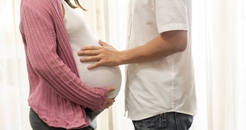 Prenatal parental stress linked to behaviour problems in toddlers
Prenatal parental stress linked to behaviour problems in toddlers
From research by University of Cambridge’s Centre for Family Research
A team of researchers from the Universities of Cambridge, Birmingham, New York and Leiden have found that expectant parents’ emotional struggles predict emotional and behavioural problems in 2-year-olds. Couple conflict helps explain emotional problems in very young children. Difficulties in children’s early relationships with both mothers and fathers can have long-term effects.
Their findings highlight a pressing need for greater support for couples before, during and after pregnancy to improve outcomes for children. The study is the first to examine the influence of both mothers’ and fathers’ wellbeing before and after birth on children’s adjustment at 14 and 24 months of age.
Lead author, Professor Claire Hughes from Cambridge’s Centre for Family Research, said: “For too long, the experiences of first-time dads has either been side-lined or treated in isolation from that of mums. This needs to change. Our findings highlight the need for earlier and more effective support for couples to prepare them better for the transition to parenthood.”
The study, published in Development & Psychopathology, drew on the experiences of 438 first-time expectant mothers and fathers who were followed up at 4, 14 and 24 months after birth. These parents were recruited in the East of England, New York State and the Netherlands.
The researchers found that the prenatal wellbeing of first-time mothers had a direct impact on the behaviour of their children by the time they were two years old. Mothers who suffered from stress and anxiety in the prenatal period were more likely to see their child display behavioural problems such as temper tantrums, restlessness and spitefulness.
The researchers also found that two-year-olds were more likely to exhibit emotional problems – including being worried, unhappy and tearful; scaring easily; or being clingy in new situations – if their parents had been having early postnatal relationship problems. These ranged from a general lack of happiness in the relationship to rows and other kinds of conflict.
While there is growing evidence for the importance of mental health support for expectant and new mothers, this study highlights the need to extend this support to expectant fathers and to go beyond individual well-being to consider the quality of new mothers’ and fathers’ couple relationships.
Read more here.
Retweet about this article:
From research by University of Cambridge’s Centre , 23/10/2019